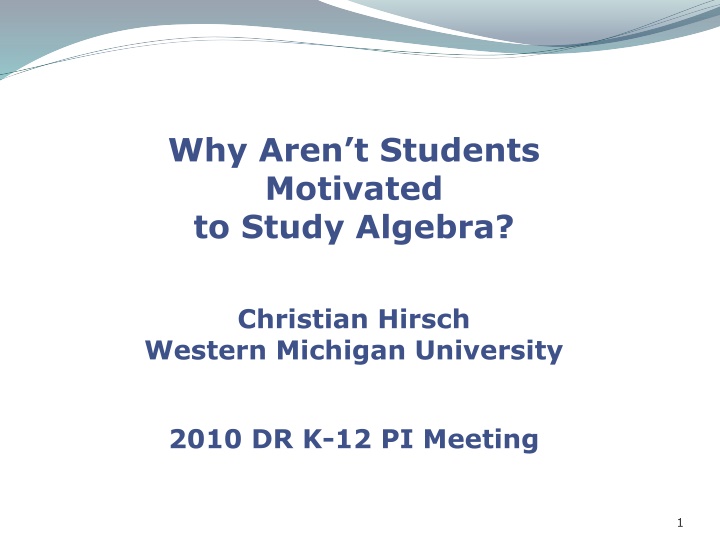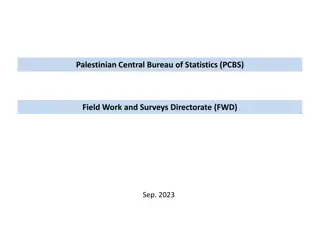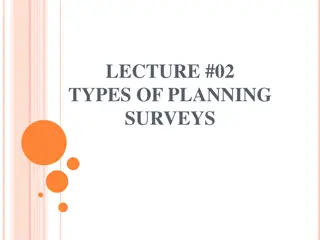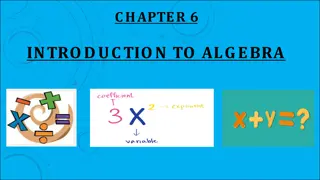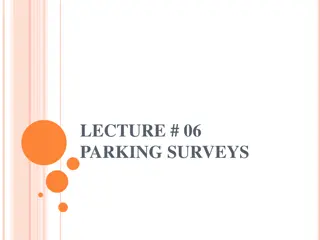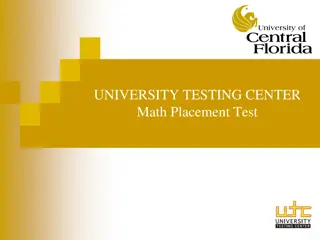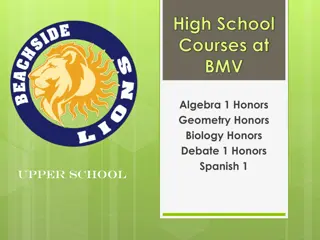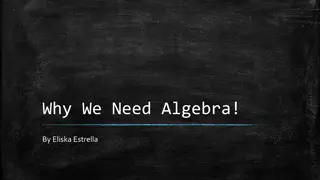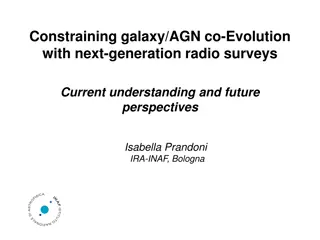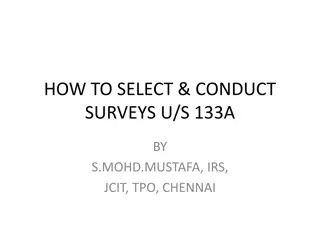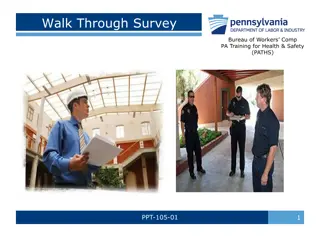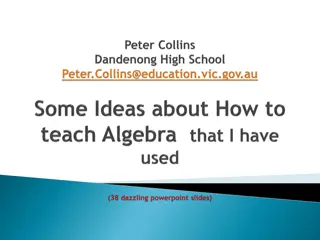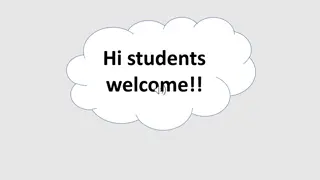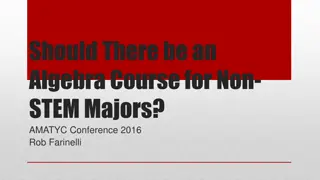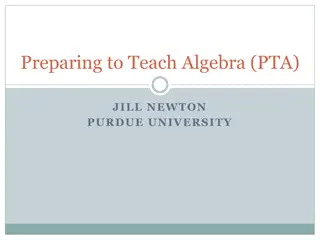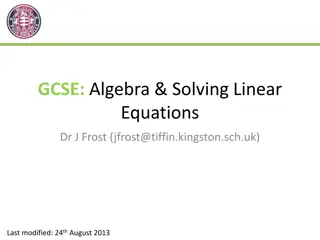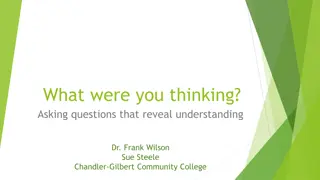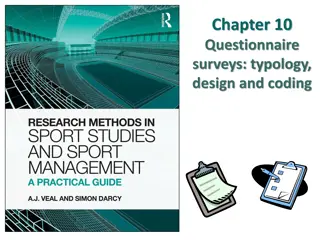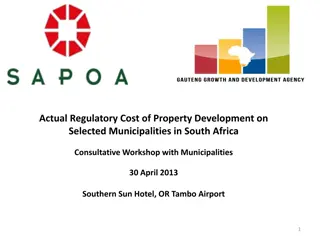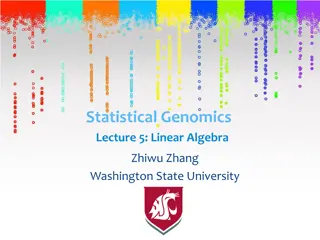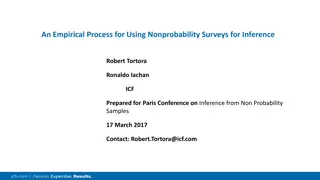Challenges in Motivating Students to Study Algebra: Insights from Surveys and Recommendations
Teachers face challenges in motivating students to study Algebra, as highlighted by survey findings. The most significant issues include working with unmotivated students, making mathematics accessible, and poor background preparation in certain topics. Recommendations focus on key topics of school Algebra, such as symbols, expressions, equations, and functions.
Download Presentation

Please find below an Image/Link to download the presentation.
The content on the website is provided AS IS for your information and personal use only. It may not be sold, licensed, or shared on other websites without obtaining consent from the author.If you encounter any issues during the download, it is possible that the publisher has removed the file from their server.
You are allowed to download the files provided on this website for personal or commercial use, subject to the condition that they are used lawfully. All files are the property of their respective owners.
The content on the website is provided AS IS for your information and personal use only. It may not be sold, licensed, or shared on other websites without obtaining consent from the author.
E N D
Presentation Transcript
Why Arent Students Motivated to Study Algebra? Christian Hirsch Western Michigan University 2010 DR K-12 PI Meeting 1
National Mathematics Advisory Panel National Survey of Algebra Teachers Conducted by the National Opinion Center, University of Chicago in spring and summer 2007 Of 310 public schools identified, 258 agreed to participate 743 randomly selected Algebra I teachers completed the questionnaire 2
Key Survey Findings In response to 10 options describing the challenges they face, a majority of the teachers (62%) rated working with unmotivated students as the single most challenging aspect of teaching Algebra I successfully. Their second highest-rated challenge 11% was making mathematics accessible and comprehensible. 3
Key Survey Findings These recent findings have characterized algebra over the last 30 plus years. LUANNby Greg Evans 4
Additional Survey Findings Teachers reported that their students had the poorest background preparation in rational numbers, word problems, and study habits. U.S. Dept. of Education, 2008 5
Panel Recommendations for the Major Topics of School Algebra Symbols and Expressions Linear Equations Quadratic Equations Functions Algebra of Polynomials Combinatorics and Finite Probability 6
Turning Algebra on Its Head One of the most important transitions from middle- to high-school mathematics is the emergence of algebraic concepts and methods for studying general numerical patterns, quantitative variables and relationships among those variables, and important patterns of change in those relationships. The mathematical ideas that are central to that kind of quantitative reasoning are variables and functions. 7
Algebra in High School Organizing school algebra around the study of the major families of elementary functions (linear, exponential, power, quadratic and polynomial, rational, and periodic) and their use in mathematical modeling offers the opportunity to bring greater coherence to the study of algebra. Fey & Good, 1985; Fey, Heid, et al., 1995 8
Algebra in High School Situating the study of school algebra in explorations of contextual settings can provide more meaning to algebra, more motivation to its study, and can provide a broader population greater access to algebraic thinking. Hirsch, Fey, et al., 2008, 2009, 2010 9
Goals and Approaches From a functions perspective, the continued study of algebra at the high school level should enable all students to develop the ability to examine data or quantitative conditions; to choose appropriate algebraic models that fit patterns in the data or conditions; to write equations, inequalities, and other calculations to match important questions in the given situations; and to use a variety of strategies to answer the questions. 10
Goals and Approaches Achievement of these goals would suggest that the study of algebra be rooted in the modeling of interesting data and phenomena in the physical, biological, and social sciences, in economics, and in students daily lives. Achievement results support this functions as models approach to school algebra. Teachers report seldom hearing students ask, Where are we ever going to use this (algebra)? Huntley, M. A., Rasmussen, C. L., Villarubi, R. S., Sangtong, J., & Fey, J. T., 2000 11
Goals and Approaches Answering questions about the situations being modeled leads to questions such as the following, some of which are at the heart of a traditional algebra program. For a given function modeling rule f(x), find f(x) for x = a; x so that f(x) = a; x so that maximum or minimum values of f(x) occur; the rate of change in f near x = a; the average value of f over the interval (a,b). 12
The Motivation Problem Revisited For further work in this area, see: Beliefs about Mathematics and Mathematics Learning in the Secondary School: Measurement and Implications for Motivation by Peter Kloosterman, in Beliefs: A Hidden Variable in Mathematics Education? (2002). G. C. Leder, E. Pehkonen, & G. T rner (Eds.). Kluwer Academic Publishers. 13
